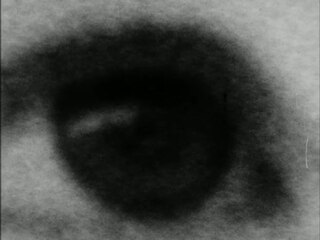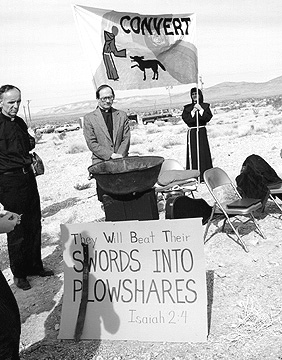Related Research Articles

Nuclear disarmament is the act of reducing or eliminating nuclear weapons. Its end state can also be a nuclear-weapons-free world, in which nuclear weapons are completely eliminated. The term denuclearization is also used to describe the process leading to complete nuclear disarmament.

Disarmament is the act of reducing, limiting, or abolishing weapons. Disarmament generally refers to a country's military or specific type of weaponry. Disarmament is often taken to mean total elimination of weapons of mass destruction, such as nuclear arms. General and Complete Disarmament was defined by the United Nations General Assembly as the elimination of all WMD, coupled with the “balanced reduction of armed forces and conventional armaments, based on the principle of undiminished security of the parties with a view to promoting or enhancing stability at a lower military level, taking into account the need of all States to protect their security.”

International Physicians for the Prevention of Nuclear War (IPPNW) is a non-partisan federation of national medical groups in 63 countries, representing doctors, medical students, other health workers, and concerned people who share the goal of creating a more peaceful and secure world free from the threat of nuclear annihilation. The organization's headquarters is in Malden, Massachusetts. IPPNW was awarded the Nobel Peace Prize in 1985.
Peace Action is a peace organization whose focus is on preventing the deployment of nuclear weapons in space, thwarting weapons sales to countries with human rights violations, and promoting a new United States foreign policy based on common security and peaceful resolution to international conflicts.

"Daisy", sometimes referred to as "Daisy Girl" or "Peace, Little Girl", is an American political advertisement that aired on television as part of Lyndon B. Johnson's 1964 presidential campaign. Though aired only once, it is considered one of the most important factors in Johnson's landslide victory over the Republican Party's candidate, Barry Goldwater, and a turning point in political and advertising history. A partnership between the Doyle Dane Bernbach agency and Tony Schwartz, the "Daisy" advertisement was designed to broadcast Johnson's anti-war and anti-nuclear positions. Goldwater was against the Nuclear Test Ban Treaty and suggested the use of nuclear weapons in the Vietnam War, if necessary. The Johnson campaign used Goldwater's speeches to imply he would wage a nuclear war.

The Rocky Flats Plant was a United States manufacturing complex that produced nuclear weapons parts in the western United States, near Denver, Colorado. The facility's primary mission was the fabrication of plutonium pits, which were shipped to other facilities to be assembled into nuclear weapons. Operated from 1952 to 1992, the complex was under the control of the U.S. Atomic Energy Commission (AEC), succeeded by the Department of Energy (DOE) in 1977.
Dr. Randall Caroline Forsberg led a lifetime of research and advocacy on ways to reduce the risk of war, minimize the burden of military spending, and promote democratic institutions. Her career started at the Stockholm International Peace Research Institute in 1968. In 1974 she moved to Cambridge, Massachusetts to found the Institute for Defense and Disarmament Studies (IDDS) as well as to launch the national Nuclear Freeze campaign.

Nevada Desert Experience is a name for the movement to stop U.S. nuclear weapons testing that came into use in the middle 1980s. It is also the name of an anti-nuclear organization which continues to create public events to question the morality and intelligence of the U.S. nuclear weapons program, with a main focus on the United States Department of Energy's (DOE) Nevada National Security Site.

The anti-nuclear movement in the United States consists of more than 80 anti-nuclear groups that oppose nuclear power, nuclear weapons, and/or uranium mining. These have included the Abalone Alliance, Clamshell Alliance, Committee for Nuclear Responsibility, Nevada Desert Experience, Nuclear Information and Resource Service, Physicians for Social Responsibility, Plowshares Movement, United Steelworkers of America (USWA) District 31, Women Strike for Peace, Nukewatch, and Women's International League for Peace and Freedom. Some fringe aspects of the anti-nuclear movement have delayed construction or halted commitments to build some new nuclear plants, and have pressured the Nuclear Regulatory Commission to enforce and strengthen the safety regulations for nuclear power plants. Most groups in the movement focus on nuclear weapons.
Anti-nuclear organizations may oppose uranium mining, nuclear power, and/or nuclear weapons. Anti-nuclear groups have undertaken public protests and acts of civil disobedience which have included occupations of nuclear plant sites. Some of the most influential groups in the anti-nuclear movement have had members who were elite scientists, including several Nobel Laureates and many nuclear physicists.

A peace movement is a social movement which seeks to achieve ideals such as the ending of a particular war or minimizing inter-human violence in a particular place or situation. They are often linked to the goal of achieving world peace. Some of the methods used to achieve these goals include advocacy of pacifism, nonviolent resistance, diplomacy, boycotts, peace camps, ethical consumerism, supporting anti-war political candidates, supporting legislation to remove profits from government contracts to the military–industrial complex, banning guns, creating tools for open government and transparency, direct democracy, supporting whistleblowers who expose war crimes or conspiracies to create wars, demonstrations, and political lobbying. The political cooperative is an example of an organization which seeks to merge all peace-movement and green organizations; they may have diverse goals, but have the common ideal of peace and humane sustainability. A concern of some peace activists is the challenge of attaining peace when those against peace often use violence as their means of communication and empowerment.

Anti-nuclear protests began on a small scale in the U.S. as early as 1946 in response to Operation Crossroads. Large scale anti-nuclear protests first emerged in the mid-1950s in Japan in the wake of the March 1954 Lucky Dragon Incident. August 1955 saw the first meeting of the World Conference against Atomic and Hydrogen Bombs, which had around 3,000 participants from Japan and other nations. Protests began in Britain in the late 1950s and early 1960s. In the United Kingdom, the first Aldermaston March, organised by the Campaign for Nuclear Disarmament, took place in 1958. In 1961, at the height of the Cold War, about 50,000 women brought together by Women Strike for Peace marched in 60 cities in the United States to demonstrate against nuclear weapons. In 1964, Peace Marches in several Australian capital cities featured "Ban the Bomb" placards.
James Peck was an American activist who practiced nonviolent resistance during World War II and in the Civil Rights Movement. He is the only person who participated in both the Journey of Reconciliation (1947) and the first Freedom Ride of 1961, and has been called a white civil rights hero. Peck advocated nonviolent civil disobedience throughout his life, and was arrested more than 60 times between the 1930s and 1980s.

Dark Circle is a 1982 American documentary film directed and produced by Judy Irving, Christopher Beaver and Ruth Landy that focuses on the connections between the nuclear weapons and the nuclear power industries, with a strong emphasis on the individual human and protracted U.S. environmental costs involved. A clear point made by the film is that while only two bombs were dropped on Japan, many hundreds were exploded in the United States.

The Rocky Flats Plant, a former United States nuclear weapons production facility located about 15 miles (24 km) northwest of Denver, caused radioactive contamination within and outside its boundaries. The contamination primarily resulted from two major plutonium fires in 1957 and 1969 and from wind-blown plutonium that leaked from barrels of radioactive waste. Much lower concentrations of radioactive isotopes were released throughout the operational life of the plant from 1952 to 1992, from smaller accidents and from normal operational releases of plutonium particles too small to be filtered. Prevailing winds from the plant carried airborne contamination south and east, into populated areas northwest of Denver.

The Campaign for Nuclear Disarmament (CND) is an organisation that advocates unilateral nuclear disarmament by the United Kingdom, international nuclear disarmament and tighter international arms regulation through agreements such as the Nuclear Non-Proliferation Treaty. It opposes military action that may result in the use of nuclear, chemical or biological weapons, and the building of nuclear power stations in the UK.
The Nuclear Freeze campaign was a mass movement in the United States during the 1980s to secure an agreement between the U.S. and Soviet governments to halt the testing, production, and deployment of nuclear weapons.
Susan Crane is a peace activist, a member of the California Catholic Worker movement and a participant in the Plowshares movement. After decades of civil disobedience related to campaigns against nuclear war, she was sentenced to jail time in Germany in 2024.
References
- ↑ "Who We Are - Civil Society Institute". Archived from the original on 2010-04-25. Retrieved 2010-04-20.
- ↑ "Archived copy" (PDF). Archived from the original (PDF) on 2011-07-27. Retrieved 2010-04-20.
{{cite web}}: CS1 maint: archived copy as title (link) - ↑ Making a Real Killing: Rocky Flats and the Nuclear West, Len Ackland, UNM Press, 2002, ISBN 978-0-8263-2798-7
- ↑ Stone, I. F.; et al. "Crackdown in Prague | by Neal Ascherson | the New York Review of Books".
{{cite magazine}}: Cite magazine requires|magazine=(help) - ↑ "Civil Warrior" Sun Sentinel, Paul Langner, April 20, 1997
- ↑ "Freeze Voter Records (DG 156), Swarthmore College Peace Collection".
- ↑ "SOLO SUCCESS PAM SOLO'S QUIET WORK FOR PEACE EARNS A MACARTHUR FOUNDATION GRANT", The Boston Globe, August 3, 1989, Susan Trausch